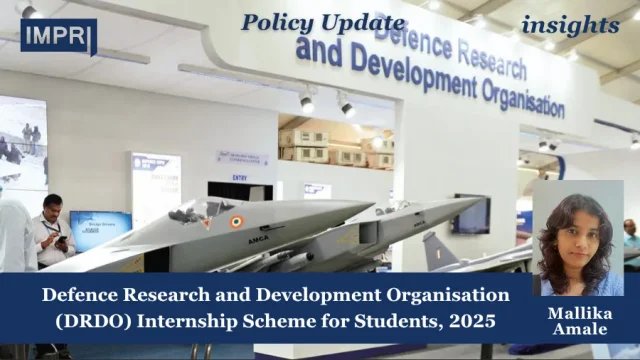Policy Update
Mallika Amale
On its 67th Foundation Day on January 1, 2025, the Defence Research and Development Organisation (DRDO) reiterated its continuing role in building India’s indigenous defence and R&D (Research & Development) capabilities. The “Scheme of Internship of Students to DRDO Labs/Estts for Project Training” aligns with this vision by bridging the gap between academia and applicable research. This initiative was primarily introduced to provide students of general sciences and engineering an opportunity to engage in real-world R&D activities in the country’s premier defence institute and laboratories.
This internship scheme, which works in tandem with other internship schemes at DRDO, is necessary because, as DRDO Chairman Dr. Samir V. Kamat has noted, although India produces a large number of engineering graduates, a skill gap persists, rendering them unable to engage meaningfully with R&D work.
Internships will be offered to graduate and post graduate students in the field of engineering and general sciences working in fields relevant to the defence sector. One notable feature of this internship scheme is its emphasis on “project training”. Students are expected to work on specific projects, offering a hands-on approach.
Functioning
The DRDO facilitates the internship scheme on the basis of a decentralised model in relation to student applications. Students are expected to apply directly to DRDO labs relevant to their discipline through their institute or colleges. The approval for the same is contingent on available vacancies and the decision is made at the discretion of the respective lab director.
Key Features of the Scheme:
- Internship training period ranges from four weeks to six months, also subject to the lab director
- Interns will be allowed to work only on unclassified projects of DRDO labs/ establishments
- The Apprentices Act of 1961 and its provisions do not apply to this scheme
- DRDO carries no obligation to offer employment after the completion of the internship training period
- DRDO shall not be liable for any compensation in case of personal injury resulting from an accident occurring during the students’ attachment to DRDO Labs/Establishments
Following documents are required during application:
- Identity Proof – (Aadhar Card, College ID, etc.)
- Passport-size Photograph
- Academic Certificates – Copies of mark sheets or transcripts from the latest completed semester
- Statement of Purpose (SOP) – Briefly explaining areas of interest
- Declaration Form – Stating compliance with DRDO rules and liability disclaimer
- Any other documents as required
Impact
The Internship Scheme will promote technical competence among the interns as they gain access to cutting edge technology in various scientific domains.
DRDO faces systemic hurdles. Various parliament reports state that nearly half of mission-mode projects are behind schedule, and that indigenous capabilities remain weak. As a result, India continues to rely heavily on imports in the defence sector. Almost all expert committees including the Kalam Committee in 1992 and Vijay Raghavan Committee in 2024 have recommended stronger integration of academia into defence R&D. This scheme is a step in the right direction as it helps develop a pipeline of young researchers oriented towards critical technology gaps.
Emerging Issues
DRDO Chairman Samir V. Kamat recently stated that India is ten-fifteen years behind developed countries in traditional defence technologies. He identified three core areas where we are lagging:
- Weak infrastructure and limited hands-on training in engineering institutions
- Fragmentation between academia, the DRDO, and the industry which continue to work in silos
- Low R&D investment: India spends only 0.65 per cent of its GDP, compared to 2-3 per cent in the U.S. and China
While the internship scheme cannot solve these structural challenges altogether, it represents one step towards capacity-building by embedding students in research projects and encouraging cross-institutional collaboration.
Moreover, the low R&D budget limits the scale of the scheme. Unpaid internships restrict access to students from less privileged backgrounds. Also safety and liability emerge as points of concern since DRDO is under no obligation to provide compensation in case of any accidents during the tenure of the internship.
Way Forward
- Alignment with National R&D Goals: Internship programs should be aligned with DRDO’s key technology gaps, such as propulsion, sensors, stealth materials, and advanced electronics. By assigning projects in these domains, student contributions can be directly connected to national research priorities.
- Leveraging Global Best Practices: Structured collaboration with IITs, universities, and start-ups should be established. Global examples like the U.S. DARPA (Defense Advanced Research Projects Agency) highlights the importance of academia–industry–government partnerships in driving high-risk, high-impact research.
- Financial Inclusion: Implement uniform stipends across all laboratories and ensure provision for travel and subsistence support.
The internship program should be established as an integral part of India’s defense R&D strategy. With enhanced funding, systematic monitoring, and alignment with priority projects, it can address DRDO’s institutional requirements while advancing India’s strategic objectives of an Atmanirbhar Bharat.
References
- Business Standard. (2024, August 06). Committee has suggested certain reforms to overhaul functioning of DRDO. Business Standard. https://www.business-standard.com/external-affairs-defence-security/news/committee-has-suggested-certain-reforms-to-overhaul-functioning-of-drdo-124080501488_1.html
- Choudhary, P. (2024, September 22). India is 10-15 years behind most countries in traditional technologies, says DRDO chief. The New Indian Express. https://www.newindianexpress.com/states/karnataka/2024/Sep/22/india-is-10-15-years-behind-most-countries-in-traditional-technologies-says-drdo-chief
- Defence Research and Development Organisation. (n.d.). Scheme of Internship of Students. Defence Research and Development Organisation, Ministry of Defence. https://www.drdo.gov.in/drdo/scheme-internship-students
- Mishra, S. N. (2024, June). Proposed Reforms for DRDO: Challenges and the Way Forward. Defence and Diplomacy, 13(3), 13-25. https://journals.capsindia.org/index.php/dnd/article/view/20
- My Scheme. (n.d.). Scheme of Internship of Students to DRDO Labs/Estts for Project Training. My Scheme. https://www.myscheme.gov.in/schemes/sisdrdolept
- Press Information Bureau, Delhi. (2025, January 03). DRDO’s 67th Foundation Day: Floral tributes paid to former President Dr APJ Abdul Kalam at his bust in DRDO Headquarters. Press Information Bureau. https://www.pib.gov.in/PressReleasePage.aspx?PRID=2090017
About the Contributor
Mallika Amale is currently interning at IMPRI. She is pursuing a Master’s in International Relations and Strategic Studies from the School of International Relations and Strategic Studies (SIRSS) at the University of Mumbai. Her research interests include India’s foreign policy, maritime security in the Indian Ocean Region, and the Indo-Pacific.
Acknowledgment
The author sincerely thanks the team at IMPRI for their valuable guidance, as well as my peers for their support during the whole process.
Disclaimer
All views expressed in the article belong solely to the author and not necessarily to the organization.



















